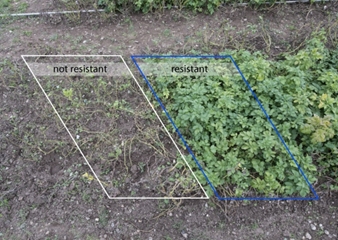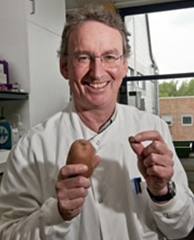Potatoes Resistant to Late Blight
|
|

|
Test field in Uganda, after effects of Late Blight.
All surviving plants are GMOs!
[Photo: Andrew Kiggundu, CIP/NARO]
|

|
|
Prof. Jonathan Jones holds a cultivated potato in his right hand,
and in his left, a wild potato that is the source of one of
the resistance genes used in the experiment.
He is delighted with the success of the field trials.
[Photo: Copyright Steve Adams]
|
The United Nations Food & Agriculture Organization ranks potatoes as "the world's number one non-grain food commodity, with production reaching a record" 382 million tonnes in 2014 (The Potato Sector, https://www.potatopro.com/world/potato-statistics). Biotech solutions for major pest and disease problems are in hand or under development.
"The potato should be a major component in strategies aimed at providing nutritious food for the poor and hungry. It is ideally suited to places where land is limited and labour is abundant, conditions that characterize much of the developing world. The potato produces more nutritious food more quickly, on less land, and in harsher climates than any other major crop - up to 85 percent of the plant is edible human food, compared to around 50% in cereals" (Why potato?, http://www.fao.org/potato-2008/en/aboutiyp/index.html).
China leads the world in potato production, at 96 million tonnes, followed by India, at 45 million. The United States ranks fifth at 20 million, after Russia (30M) and Ukraine (22M). Unlike most major food crops, however, potatoes are not a leading commodity in global trade; most production is consumed within the same region where it was produced. Dramatic shifts have marked the potato sector in recent decades as production in developing country harvests have surged past those in industrial nations, and production in Asia has exploded.
The most famous threat to potatoes is a fungal disease, Phytophthora infestans, known as "late blight," which was famously responsible for the Irish potato famine between 1845 and 1852. Late blight can destroy a previously healthy field of potatoes in a matter of days. Public sector researchers in England have used biotechnology to develop blight resistant varieties by adding a resistant gene from wild potatoes (Early success for Late Blight Resistance trial in Potatoes, http://www.tsl.ac.uk/news/early-success-late-blight-resistance-trial-potatoes/). Similar research by Ugandan researchers collaborating with the International Potato Center in Peru have also yielded promising results in field trials (Uganda's first field observation of GM potato shows extreme resistance to late blight, http://www.isaaa.org/kc/cropbiotechupdate/article/default.asp?ID=14096).
Although of lesser importance, insect pests (e.g., the Colorado potato beetle) and viral diseases (potato leaf roll virus) also create significant problems for potato farmers. Biotech solutions to these challenges have been developed, but commercialization has been blocked due to opposition propaganda campaigns by special interest groups (Monsanto's Genetically Modified Potatoes Find Slim Market, Despite Repelling Bugs, https://www.wsj.com/articles/SB985128671233949916; The Rise and Fall of NewLeaf Potatoes, http://nabc.cals.cornell.edu/Publications/Reports/nabc_15/15_7_2_Thornton.pdf).
Blocking agricultural innovation in well fed industrial nations is lamentable; impeding it in developing countries where the human needs for nutrition and food security are much greater and more vulnerable is another thing altogether. Hopefully, recent political developments will clear the way for plant breeders and researchers to bring these new crops forward and put them into the hands of those who need them most (Uganda parliament passes biosafety Bill on GM products, http://www.theeastafrican.co.ke/scienceandhealth/Uganda-parliament-passes-biosafety-Bill-on-GM-products/3073694-4129618-l27vpxz/index.html; Field trials move Kenya closer to GMO bananas, http://www.businessdailyafrica.com/news/Field-trials-move-Kenya-GMO-bananas/539546-4097126-3bedv1z/).
Towards a Late Blight resistant potato for Africa - video illustrating efforts to develop and release a genetically engineered potato variety with late blight resistance...
|
|
|







